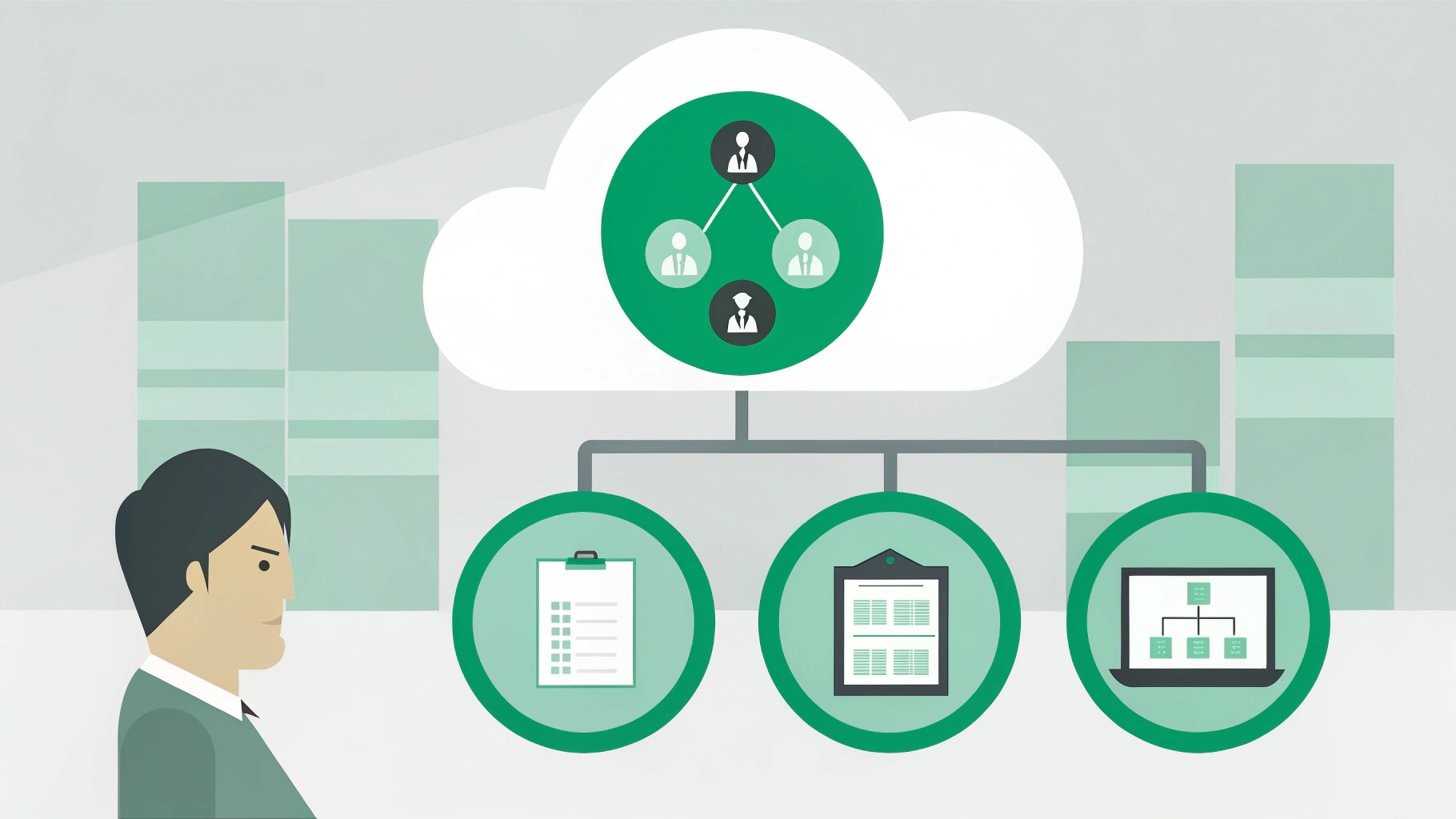Overview
This article delves into the transformative benefits of Enterprise Resource Planning (ERP) solutions, particularly in enhancing distribution efficiency. ERP systems play a pivotal role in streamlining operations and elevating overall business performance. By facilitating superior inventory management, expediting order processing, and ensuring data accuracy, these systems lead to substantial efficiency gains. Consequently, distributors can expect a notable increase in return on investment.
Consider how ERP solutions can revolutionize your operations. They not only optimize day-to-day tasks but also empower your team with the tools needed for informed decision-making. Imagine the impact of improved inventory oversight and faster order fulfillment on your bottom line. With ERP, the path to operational excellence is clearer than ever.
In conclusion, embracing ERP technology is not just a strategic move; it’s a necessary step towards achieving significant operational improvements and maximizing profitability. For distributors seeking to thrive in a competitive landscape, the time to act is now.
Introduction
The landscape of distribution is rapidly evolving, compelling businesses to seek innovative solutions that enhance efficiency and responsiveness. Enterprise Resource Planning (ERP) systems have emerged as pivotal tools, offering a suite of benefits that streamline operations, improve data visibility, and foster collaboration across departments. As organizations strive to adapt to changing market demands, a critical question arises: how can ERP solutions not only simplify processes but also drive significant growth and efficiency in distribution? This exploration delves into the transformative impact of ERP, revealing its potential to revolutionize the distribution sector while addressing the challenges that may accompany its implementation.
Defining ERP Benefits: A Comprehensive Overview
The [ERP benefits](https://10xerp.com/features) of Enterprise Resource Planning (ERP) solutions include a wealth of advantages that significantly streamline business processes, enhance data visibility, and improve decision-making capabilities. By integrating various organizational functions into a cohesive platform, ERP solutions facilitate real-time data access and foster collaboration among departments. This integration not only boosts workflow productivity but also reduces expenses and elevates customer satisfaction.
For distributors, the ability to manage inventory, monitor orders, and analyze financial data within a single platform is invaluable. This capability minimizes errors and accelerates response times to market demands, leading to a reported 30% increase in ROI within three years of implementation. Furthermore, 89% of ERP users report that the efficiency enhancements are one of the key ERP benefits, underscoring the transformative impact of these solutions on operational workflows.
Real-world examples illustrate that companies leveraging ERP solutions experience ERP benefits, such as improved visibility into their operations, enabling informed decision-making that aligns with strategic objectives. As businesses increasingly prioritize the integration of eCommerce with ERP solutions, adapting to evolving consumer behaviors becomes essential, with 90% of B2B buyers initiating their purchasing journey online. This trend underscores the necessity for distributors to adopt ERP solutions that not only but also provide the agility required to thrive in a competitive environment.
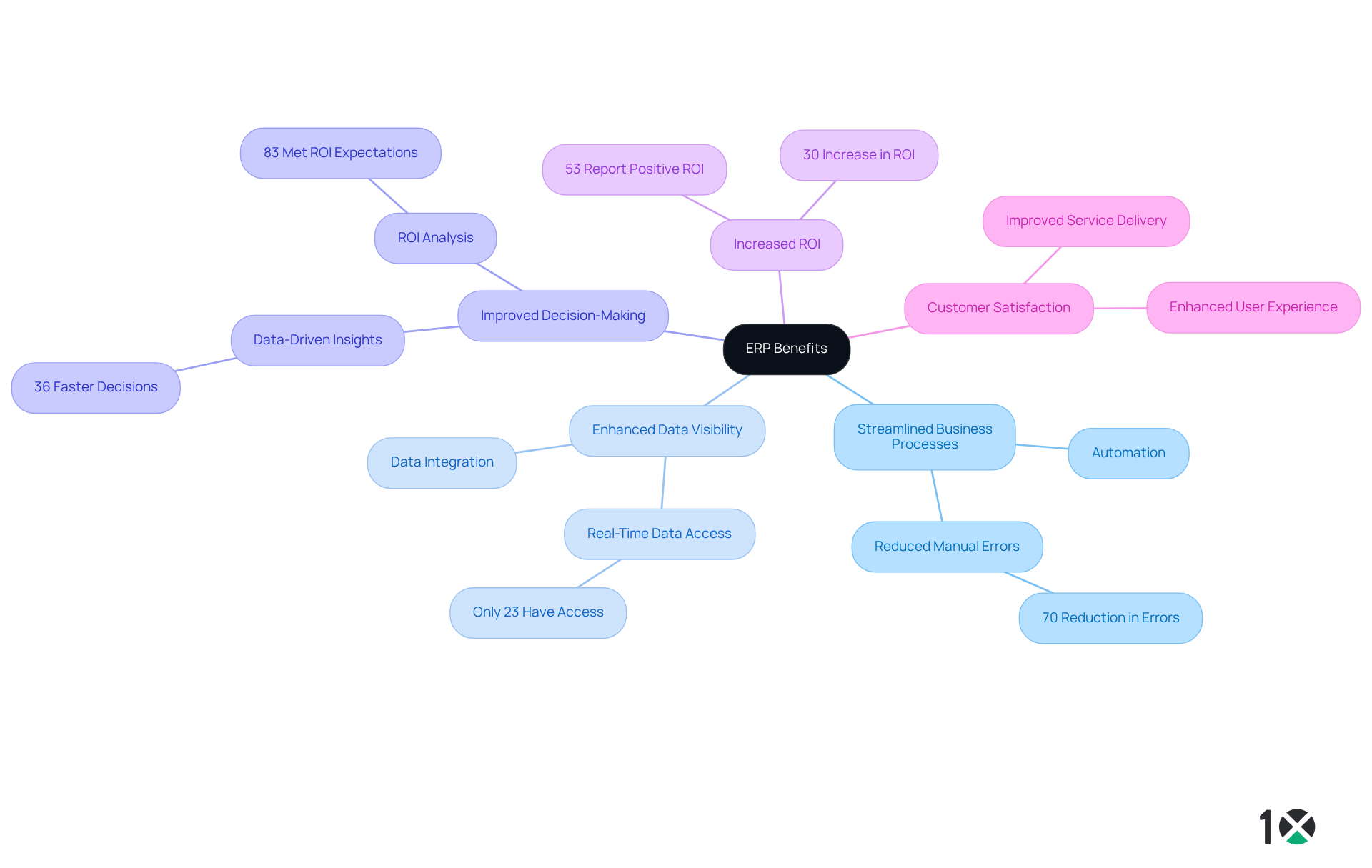
Key Advantages of ERP for Distribution Efficiency
The key advantages of ERP systems for enhancing distribution efficiency are multifaceted:
- Enhanced Inventory Management: ERP solutions provide real-time insight into inventory levels, allowing distributors to optimize stock levels efficiently. This capability not only reduces excess inventory but also mitigates the risk of stockouts, ensuring that products are available when needed. Companies that adopt ERP solutions frequently report a 38% decrease in inventory levels, which underscores the ERP benefits in effective inventory management. With , customizable attributes and powerful cross-referencing enhance tracking, ensuring you know exactly where your inventory is at any time.
- Streamlined Order Processing: By automating order entry and processing, ERP solutions significantly reduce manual errors and accelerate fulfillment times. This automation leads to faster order processing, which is crucial in meeting customer expectations and enhancing satisfaction. Companies leveraging ERP technology have noted a 35% reduction in cycle times, showcasing the efficiency gained through streamlined operations. Moreover, 40% of enterprises realize IT savings after implementing an ERP solution, which demonstrates the ERP benefits of these enhancements.
- Enhanced Data Precision: Centralized data storage within ERP platforms ensures that all departments access consistent information, thereby reducing discrepancies and improving reporting precision. This integration promotes a single source of truth, essential for effective decision-making and transparency in operations. With 10X ERP’s robust accounting features, stakeholders can rely on real-time data processing to make informed decisions.
- Improved Financial Management: ERP solutions come equipped with robust accounting features that facilitate real-time financial reporting, budgeting, and forecasting. This functionality empowers distributors to make informed financial decisions, ultimately enhancing their overall financial health and operational efficiency. Notably, 30% of organizations choose ERP software for better financial management, illustrating the ERP benefits of these features.
- Enhanced Cooperation: By merging different functions throughout the organization, ERP solutions encourage collaboration among departments. This interconnectedness leads to more cohesive operations and improved communication, which are essential for responding swiftly to market changes and customer demands. As emphasized, “by combining various functions from throughout your organization into a single, cohesive structure, you’ll achieve essential visibility and agility.” This integration not only enhances agility in operations but also promotes a culture of collaboration that propels business success.
In summary, the application of ERP solutions in distribution not only streamlines order processing but also improves overall performance, preparing businesses for sustained growth and success.
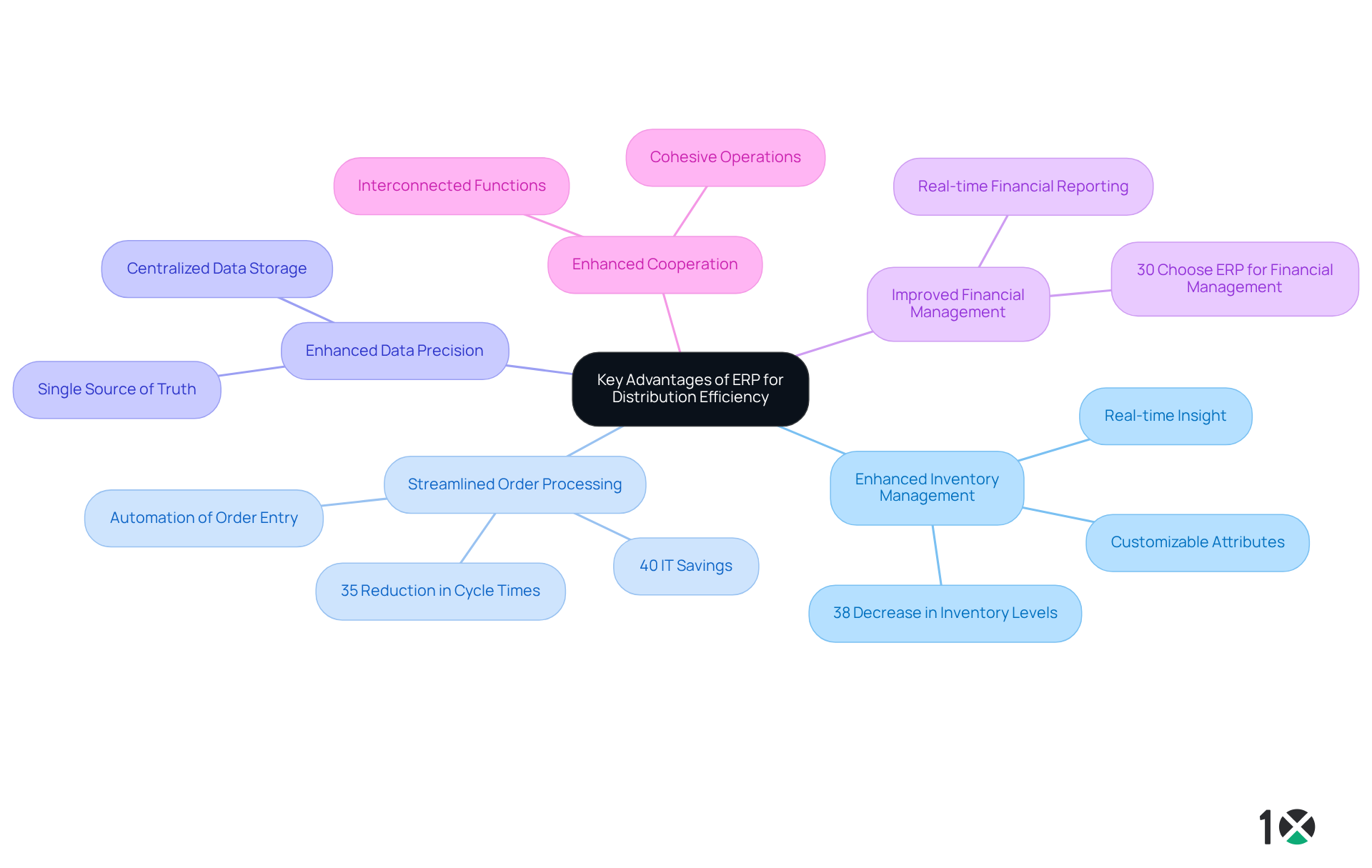
Real-World Applications: How ERP Enhances Distribution Operations
Real-world applications of ERP solutions in distribution demonstrate a significant impact on operational efficiency. For example, a leading food distributor implemented 10X ERP, which offers a seamless user experience and transparent pricing, to integrate inventory management with order processing. This integration resulted in a remarkable 30% reduction in order fulfillment times and improved inventory turnover rates. Similarly, a wholesale distributor utilized 10X ERP’s robust support and real-time data processing capabilities to enhance its financial reporting processes, achieving a 25% decrease in month-end closing times.
Research indicates that:
- 95% of companies adopting ERP systems report process improvements, demonstrating the ERP benefits of these solutions.
- 40% of companies experienced IT savings post-implementation of ERP technology, highlighting the ERP benefits alongside efficiency improvements.
These instances highlight how 10X ERP not only boosts but also contributes to superior customer service and increased profitability.
However, it is crucial to acknowledge that 50% of ERP implementations fail during their initial attempts, revealing the challenges organizations may encounter. Despite these obstacles, the potential for growth and enhanced efficiency positions 10X ERP as an essential tool for distributors striving to succeed in a competitive market.
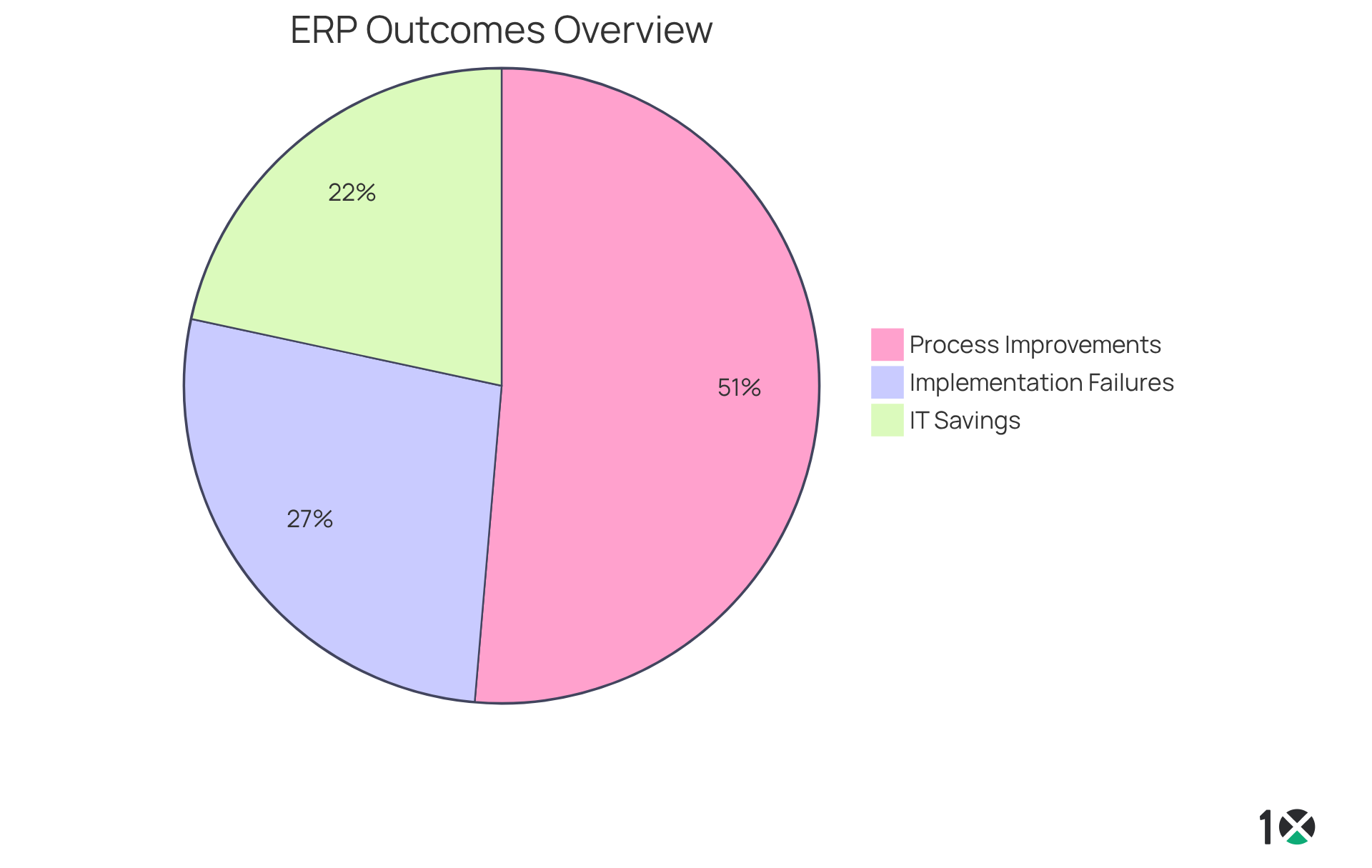
Challenges and Considerations in ERP Implementation
Implementing ERP solutions offers significant advantages; however, organizations often encounter substantial challenges. A primary obstacle is employee resistance to change, with 82% of employees recognizing this as a critical barrier. To effectively address this resistance, it is essential to in the process. This approach cultivates a sense of ownership and understanding of the new framework’s benefits. Comprehensive training programs are vital, as untrained users may require considerably more assistance, impacting overall success. Additionally, transparent communication about the ERP benefits can alleviate concerns and enhance acceptance.
Data migration complexities also present challenges, necessitating early and thorough planning to ensure a seamless transition. Selecting an ERP solution tailored to the specific needs of the distribution industry can significantly enhance implementation outcomes. Organizations should prioritize ongoing support and updates to adapt to evolving business environments, ensuring that the ERP platform remains aligned with operational objectives. By proactively addressing these challenges, companies can improve their chances of successful ERP implementation and fully realize the ERP benefits.
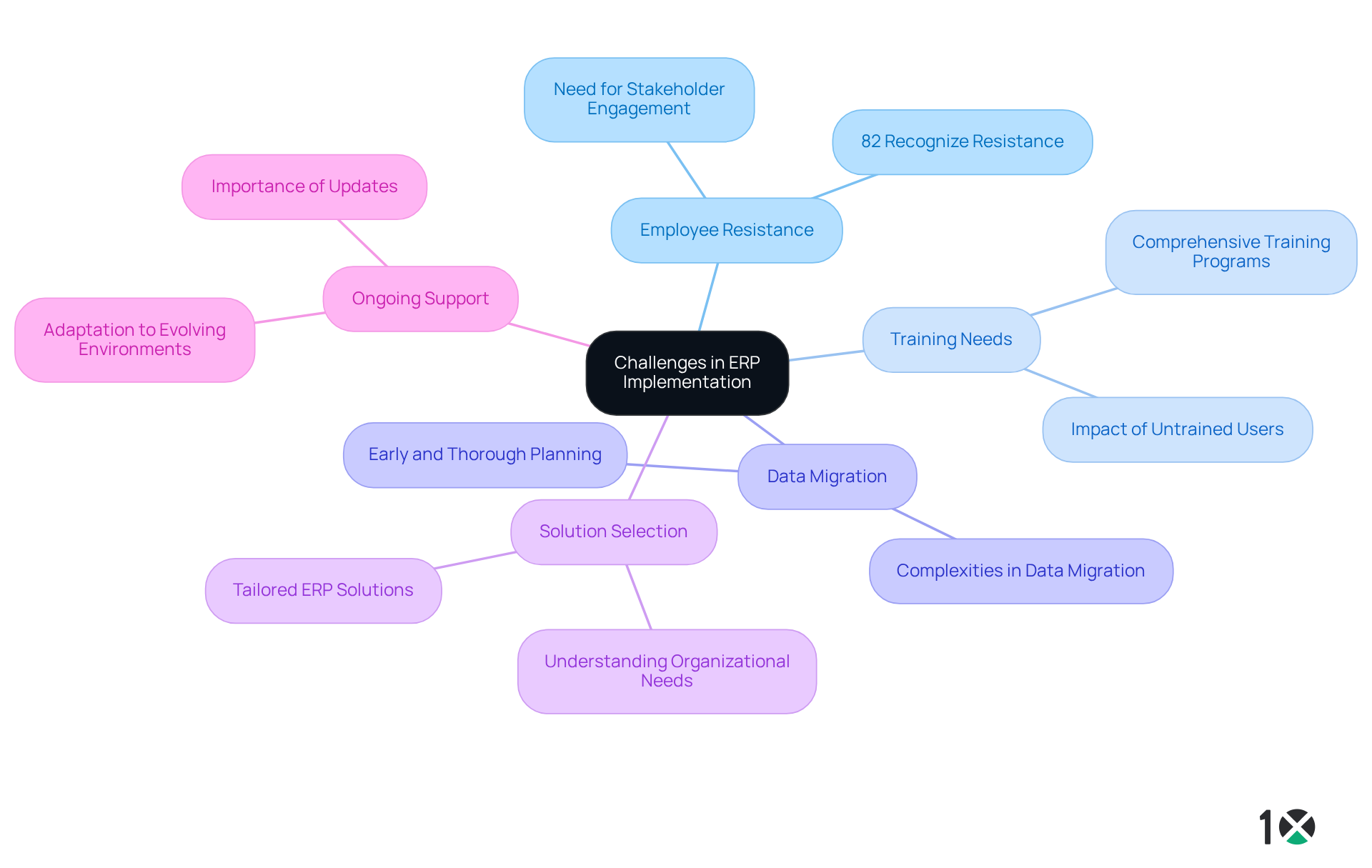
Conclusion
The exploration of ERP benefits reveals a transformative potential for organizations seeking to enhance their distribution efficiency. By integrating various functions into a unified system, ERP solutions streamline operations and empower businesses to make informed decisions. This ultimately leads to improved customer satisfaction and increased profitability.
Key insights highlight the multifaceted advantages of ERP systems, including:
- Enhanced inventory management
- Streamlined order processing
- Improved financial oversight
Real-world applications demonstrate the effectiveness of these solutions, with many companies reporting significant reductions in order fulfillment times and operational costs. Despite challenges associated with implementation, such as employee resistance and data migration complexities, the overall impact of ERP on distribution efficiency is overwhelmingly positive. A majority of users experience substantial process improvements.
The significance of ERP in today’s competitive landscape cannot be overstated. Embracing these solutions is not merely a choice but a necessity for distributors aiming to thrive. As the market continues to evolve, leveraging ERP technology is crucial for organizations to adapt, innovate, and maintain a competitive edge. Taking proactive steps towards ERP adoption and addressing potential challenges will ensure that businesses can fully harness the benefits and achieve sustained growth in their distribution operations.
Frequently Asked Questions
What are the main benefits of Enterprise Resource Planning (ERP) solutions?
ERP solutions streamline business processes, enhance data visibility, and improve decision-making capabilities by integrating various organizational functions into a cohesive platform.
How do ERP solutions impact workflow productivity?
By facilitating real-time data access and fostering collaboration among departments, ERP solutions boost workflow productivity and reduce expenses.
What specific advantages do ERP solutions offer to distributors?
Distributors benefit from managing inventory, monitoring orders, and analyzing financial data within a single platform, which minimizes errors and accelerates response times to market demands.
What is the reported return on investment (ROI) for companies after implementing ERP solutions?
Companies experience a reported 30% increase in ROI within three years of implementing ERP solutions.
What percentage of ERP users report efficiency enhancements as a key benefit?
89% of ERP users report that efficiency enhancements are one of the key benefits of using ERP solutions.
How do ERP solutions help in decision-making for businesses?
ERP solutions improve visibility into operations, enabling informed decision-making that aligns with strategic objectives.
Why is it important for businesses to integrate eCommerce with ERP solutions?
As 90% of B2B buyers initiate their purchasing journey online, integrating eCommerce with ERP solutions is essential for adapting to evolving consumer behaviors and maintaining competitiveness.
What overall impact do ERP solutions have on customer satisfaction?
By streamlining processes and improving operational efficiency, ERP solutions elevate customer satisfaction.
